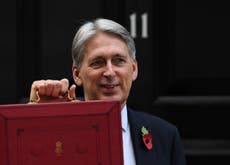Budget 2018: Austerity still not over for government departments, warns Institute for Fiscal Studies
Paul Johnson of the IFS said: ‘Many public services are going to feel squeezed for some time to come’
Philip Hammond has taken a “gamble” with the UK economy which could lead to higher borrowing and debt in coming years, the Institute for Fiscal Studies has warned.
In its reaction to Monday’s Budget, the respected thinktank also cast doubt on his claim austerity for the public sector is “coming to an end”, pointing out that despite the £20bn increase in spending on the NHS by 2023, other departments were still facing serious cuts over coming years.
It said the chancellor may have “painted himself into a corner” by using a windfall from revised borrowing forecasts to fund increased spending on the NHS.
And it warned that tax rises are “all but inevitable” in the longer run to pay for the pressure on the NHS of Britain’s ageing population.
Any expectation that Mr Hammond will now meet his target of eliminating the deficit by the mid-2020s was “for the birds”, said director Paul Johnson.
Despite Mr Hammond’s claims that the economy has “turned a corner” on the way to the end of austerity, Mr Johnson said that Monday’s Budget was “no bonanza” for public services other than the NHS.
“Total day-to-day spending on public services is planned to rise by about 8 per cent between now and 2023-24, but spending outside of protected areas is essentially flat – and indeed ticks up next year before falling a bit. It falls on a per capita basis,” said Mr Johnson.
“Does that add up to the end of austerity? On a narrow definition perhaps it does, on wider definitions it doesn’t, at least not yet.”
He added: “Many public services are going to feel squeezed for some time to come. Cuts are not about to be reversed. If I were a prison governor, a local authority chief executive or a headteacher I would struggle to find much to celebrate. I would be preparing for more difficult years ahead.”
The IFS also pointed out that the NHS’s increased real terms funding of 3.4 per cent a year was still lower than the service has typically had since its foundation in the 1940s.
“Despite its favoured status, there is nothing particularly historic about these announcements,” said Mr Johnson.
Its report also said the extra money in the Budget for universal credit was “just about enough” to make the new system more generous than the one it replaces.
“With some other changes designed to smooth its rollout, this will increase planned spending on universal credit by around £2bn a year,” Mr Johnson said.
“For many people this increase in work allowances will essentially undo the cuts announced by George Osborne in 2015 – though not for the childless non-disabled. Their work allowances were cut to zero in 2015 and there they remain.”
But the IFS chief also pointed out that planned cuts to other benefits were much more significant than the extra money allocated to universal credit yesterday.
“Four years of benefit freezes, and the ending of family premiums and of payments in respect of third and subsequent children are a much bigger deal than this increase in work allowances,” he added.
John McDonnell, the shadow chancellor, said: “The IFS has confirmed that this is a broken promise Budget with austerity set to continue for years.
“The IFS makes clear there are still over £4bn of welfare cuts to come, on top of the dreadful suffering universal credit and other social security cuts have inflicted.”
But Theresa May’s spokeswoman said she “did not agree with that sort of language” from the IFS, insisting the government’s successful economic management was allowing to increase spending, cut taxes and pay down the deficit.
Earlier, the Resolution Foundation thinktank, separately stressed that despite the increase in the generosity of universal credit announced by Mr Hammond on Monday, which reversed some of the cuts imposed by his predecessor George Osborne, three-quarters of the total welfare cuts pencilled in since 2015 were still official government policy.
And the thinktank also calculated that 84 per cent of the cash benefit of the chancellor’s income tax cuts will go to the top half of the income distribution next year, and by the end of the parliament almost half will go to the top 10 per cent of households alone.
“While yesterday’s Budget represented a seismic shift in the government’s approach to the public finances, it spelled an easing rather than an end to austerity – particularly for low and middle income families,” said the Resolution Foundation’s director Torsten Bell.
PA contributed to this report
Subscribe to Independent Premium to bookmark this article
Want to bookmark your favourite articles and stories to read or reference later? Start your Independent Premium subscription today.



Join our commenting forum
Join thought-provoking conversations, follow other Independent readers and see their replies
Comments